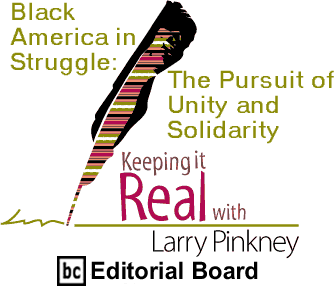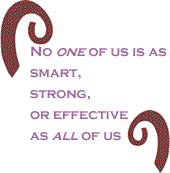
|
|||||||||||||||||||||
 |
|||||||||||||||||||||
|
||||||||||
 |
||||||||||
|
||||||||||
The current issue is always free to everyone If
you need the access available to a |
||||||||||
 |
||||||||||
Black America is not monolithic, nor should it be. The political struggle by conscious and seriously progressive Black Americans, in concert with our Black, Red, and Brown sisters and brothers, must be one based upon firm principles that are rooted in unity, respect, and mutual solidarity. We must, however, also be cognizant of our differences and utilize them in fashions that serve the interests of attaining and maintaining unity and solidarity. Despite the important commonality of experiences, history, and culture that most of us in Black America share, there are, to be sure, differences in approach and perspective amongst Black Americans. This is not a bad thing. Serious political struggle has differing components, including approach and perspectives, which need to be recognized and wherever possible, effectively honed and coordinated. In the 21st century, Black, Brown, and Red peoples continue to share deep concerns regarding many issues including: racism, health care, the environment / global climate change, police brutality, reparations, the burgeoning US prison population, justice / equality and parity, de facto US educational apartheid, and the ongoing US wars of aggression (at home and abroad), to name a few. However, all of these issues are irretrievably linked; Black people and our Brown and Red brothers and sisters know and have known this intensely since the inception of the United States of America, itself. Thus, our struggle, if it is to be effective, is one that is in deliberate / conscious pursuit of attaining viable unity and solidarity between Black people and our conscious sisters and brothers of color. Nothing short of this will suffice in making the much needed systemic / structural change that is necessary for America and the planet. Unity does not mean being monolithic. It means tactically and strategically coming together [i.e. the struggle] to consistently affect meaningful systemic change for common objectives. Unity also means having the good sense to know that no one of us is as smart, strong, or effective as all of us. We must beware of those who, today, publicly & smugly, sometimes blatantly and sometimes subtlety, indulge in deprecating the accomplishments and sacrifices of our past fallen and deceased leaders in this ongoing struggle, as if these deprecators (these would-be philosopher-activists) are themselves in the 21st century - walking on water or sitting upon some unassailable throne/s of purity, wisdom, and correctness. To reiterate: No one of us is as smart, strong, or effective as all of us. This is what actual unity and effective struggle are really all about.
Notwithstanding enormous personal cost and despite human frailties, Nat Turner, Denmark Vesey, Crazy Horse, Sitting Bull, Geronimo, Harriet Tubman, W E B Du Bois, Malcolm X, Rosa Parks, Mary McLeod Bethune, Marcus Garvey, Patrice Lumumba, Martin Luther King, Jr., Cesar Chavez, Che Guevara, Huey P. Newton, Robert Williams, and so very many others have shown us the way of this struggle. Ours is to respect and build upon the foundation that these women and men already have lain. Solidarity, too, is not passive. It is actively conscious. This means that we must actively struggle to make solidarity something that is more than a mere word or a beautiful concept. This is, in itself, a simultaneous inward and outward struggle for each of us individually and collectively. It’s often not easy, but it’s well worth the effort, for potentially within each of us lies a spirit just waiting to carry on in some new, different, or creative manner in pursuit, and ultimate attainment of, the much needed and well-rewarded unity and solidarity in the struggle of our peoples. Dr Frantz Fanon, in the book, Toward
the African Revolution (Fanon, Frantz) Onward now brothers and sisters as we struggle to keep it real. BC Editorial Board member,
Larry Pinkney is a veteran of the Black Panther Party, the
former Minister of Interior of the Republic of New Africa,
a former political prisoner and the only American to have
successfully self-authored his civil/political rights case
to the United Nations under the International Covenant on
Civil and Political Rights. For more about Larry Pinkney
see the book, Saying
No to Power: Autobiography of a 20th Century Activist and
Thinker
|
||||||||||
| November
15 , 2007 Issue 253 |
|
| Printer Friendly Version in resizeable plain text format format |
 |
 |
 |
| |
| |






























